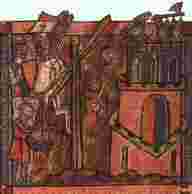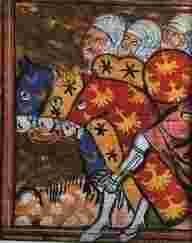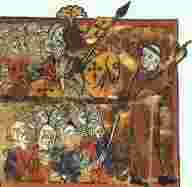

![]()
 He was born in a castle sometime during the twelfth century. It was the
same castle that his father and grandfather before him had been born and
lived in all their lives. The estate was magnificent and completely
self-sustaining. The grounds around the main citadel stretched for miles
and included vineyards and farmland as well as fields for cattle and sheep.
A small freshwater lake nearby fed several streams which supplied water
to the manor house and provided for irrigation. Only a few miles away on
the coast was a harbor which attracted trading ships from all around
Europe. The castle itself was enormous and could house hundreds in
complete comfort and security. Outer walls had been constructed one
hundred feet high and twelve feet thick to withstand the fiercest of sieges.
Inside the barbicans, however, these same walls were covered with
luxurious handmade tapestries depicting scenes of everyday life to
maintain the warmth dispersed by the many fireplaces within. Overall the structure rivaled in
opulence and fortifications the palaces possessed by the wealthiest and most powerful of kings.
Unfortunately, it wasn't his castle, nor would it ever be. He entered the world with a particular
status in life. Unless misfortune befell him, he would leave the world as an old man just as he had
entered it, a yeoman in servitude to a knight of the realm.
He was born in a castle sometime during the twelfth century. It was the
same castle that his father and grandfather before him had been born and
lived in all their lives. The estate was magnificent and completely
self-sustaining. The grounds around the main citadel stretched for miles
and included vineyards and farmland as well as fields for cattle and sheep.
A small freshwater lake nearby fed several streams which supplied water
to the manor house and provided for irrigation. Only a few miles away on
the coast was a harbor which attracted trading ships from all around
Europe. The castle itself was enormous and could house hundreds in
complete comfort and security. Outer walls had been constructed one
hundred feet high and twelve feet thick to withstand the fiercest of sieges.
Inside the barbicans, however, these same walls were covered with
luxurious handmade tapestries depicting scenes of everyday life to
maintain the warmth dispersed by the many fireplaces within. Overall the structure rivaled in
opulence and fortifications the palaces possessed by the wealthiest and most powerful of kings.
Unfortunately, it wasn't his castle, nor would it ever be. He entered the world with a particular
status in life. Unless misfortune befell him, he would leave the world as an old man just as he had
entered it, a yeoman in servitude to a knight of the realm.
The yeoman's education came as an apprenticeship in a trade. Only royalty or those destined for the church ever learned to read or write. There would never be any choice for what profession or for what goals one might wish to achieve. One simply did whatever one was born into doing. There was a rigid caste system to follow, and so in the steps of his father and grandfather, he learned the art of being a woodsman.
From the earliest moments of his life, the yeoman spent his youth serving the needs of the woods surrounding the estate learning how to use every element of the forest. Whether it was cultivating wood for carpentry, or studying the migratory habits of game animals, he learned to survive and exist under the trees. There would be no other teachers for him other than his father and the older apprentices also in servitude. The apprentices would sometimes spend weeks and even months in the surrounding forests. Living in shelters made from branches and wearing clothes fabricated from the skins of the animals killed for food. It was here that the yeoman learned what foods could be found growing in the wild, where to find water during droughts and even to follow the signs left by animals to track them in the densest woods. His only purpose in life, and the only thing he would be educated for, was to cultivate the resources of the woods so that he could contribute to the feeding and defense of the estate. Over time he became so very good at his job that Chaucer when describing him stated that:
"And he was clad in cote and hood of greene.
A sheef of pecok arwes, bright and keen,
Under his belt he bar ful thriftily;
Wel coude he dresse his takel yemanly:
His arwes drouped nought with feathers lowe.
And in his hands he bar a mighty bowe."
![]()
 Most importantly he was taught the tools of his trade. He learned how to
use an ax to cut and shape the wood from trees and how a knife could skin
and butcher the carcasses of game. Above all among these devices he was
constantly drilled with the bow and arrow until it became an extension of
his body. He was taught which trees to harvest the best wood from to make
the most flexible bows and straightest shafts for arrows. He could gut deer
and tan the leather strips to make the tautest strings. Even what birds
possessed feathers for the finest quills. This knowledge would be put to
everyday use in helping to feed the castle, but more importantly in time of
war it would be a skill needed to defend the fortress from invaders.
Most importantly he was taught the tools of his trade. He learned how to
use an ax to cut and shape the wood from trees and how a knife could skin
and butcher the carcasses of game. Above all among these devices he was
constantly drilled with the bow and arrow until it became an extension of
his body. He was taught which trees to harvest the best wood from to make
the most flexible bows and straightest shafts for arrows. He could gut deer
and tan the leather strips to make the tautest strings. Even what birds
possessed feathers for the finest quills. This knowledge would be put to
everyday use in helping to feed the castle, but more importantly in time of
war it would be a skill needed to defend the fortress from invaders.
![]()
 The day came that the lord of the castle received a command from the
king to send troops to join in a crusade to liberate the Holy Land from its
Moslem captures. Conscripted with many other inhabitants of the castle,
the yeoman was sent out under the leadership of the lord's son whom the
king himself had recently knighted. Although the knight and the yeoman
were of the same age, they had never met before. Highborn youth in
medieval England were kept separate from the lower classes of society.
While the yeoman had been taught all he knew by his father, the knight had
been educated separately and more diversely than the other children of the
fiefdom. Unlike all the common children, the knight had been taught to read and write by clerics
brought into the castle from the local monastery. Tutors from far off places had been employed to
introduce him to art, literature, music and the social graces. There was never any doubt that the
knight's destiny was set on a higher path than most others. His training and leadership of the troop
were not based on skill but on his social stature.
The day came that the lord of the castle received a command from the
king to send troops to join in a crusade to liberate the Holy Land from its
Moslem captures. Conscripted with many other inhabitants of the castle,
the yeoman was sent out under the leadership of the lord's son whom the
king himself had recently knighted. Although the knight and the yeoman
were of the same age, they had never met before. Highborn youth in
medieval England were kept separate from the lower classes of society.
While the yeoman had been taught all he knew by his father, the knight had
been educated separately and more diversely than the other children of the
fiefdom. Unlike all the common children, the knight had been taught to read and write by clerics
brought into the castle from the local monastery. Tutors from far off places had been employed to
introduce him to art, literature, music and the social graces. There was never any doubt that the
knight's destiny was set on a higher path than most others. His training and leadership of the troop
were not based on skill but on his social stature.
![]()
 As an archer the yeoman fought in some of the fiercest battles. His
courage and skill was brought to the attention of the knight. They began to
develop a mutual respect for one another that over many years away
together in the crusades became a comradeship. They could never be true
friends because of the differences in caste, but a relationship of sorts could
exist as long as the yeoman knew and kept to his place as servant to the
other.
As an archer the yeoman fought in some of the fiercest battles. His
courage and skill was brought to the attention of the knight. They began to
develop a mutual respect for one another that over many years away
together in the crusades became a comradeship. They could never be true
friends because of the differences in caste, but a relationship of sorts could
exist as long as the yeoman knew and kept to his place as servant to the
other.
![]()
 When the wars were over and they had returned home, over time it came
to pass that both of their fathers passed away. And so it was that the knight
assumed his responsibility as lord of the manor, and the yeoman replaced
his father as the forester of the estates. They would be in contact often
now because as forester the yeoman would regularly have to report to the
knight concerning the status of the surrounding lands. Although the
relationship was cordial no matter how much time was spent together the
knight was still always master. Even when the yeoman had performed some
personal service, for which his lord might have rewarded him with some
great token of thanks, they always maintained a distance. The yeoman
could only provide advice when it was asked for.
When the wars were over and they had returned home, over time it came
to pass that both of their fathers passed away. And so it was that the knight
assumed his responsibility as lord of the manor, and the yeoman replaced
his father as the forester of the estates. They would be in contact often
now because as forester the yeoman would regularly have to report to the
knight concerning the status of the surrounding lands. Although the
relationship was cordial no matter how much time was spent together the
knight was still always master. Even when the yeoman had performed some
personal service, for which his lord might have rewarded him with some
great token of thanks, they always maintained a distance. The yeoman
could only provide advice when it was asked for.
Fifteen times over the next few years, the knight would leave on adventures battling for this cause or that. He was clearly not very particular to what kingdoms he gave support to. He traveled about Europe fighting for different causes and kings as he went along. Once he even commanded an army for the lord of Palatia against another heathen in Turkey. As Chaucer said of him:
"This ilke worthy Knight hadde been also
Sometime with the lord of Palatye
Again another hethen in Turkey;
And evermore hadde a soverein pris."
He would always return home however with valuable treasures to extend the wealth of the castle estates. Each time he would leave the knight would take the yeoman. Having a servant was a necessity. However, having one nearby who had a combination of amazing skills with a bow and arrow, and the experiences of many military campaigns, was extremely valuable in hostile places. Three times in Algeria the yeoman acted as a second for the knight when he was called to joust.
Similarly when the knight's son became of age and went off on military campaigns of his own, the knight sent the yeoman along not only as a servant but also as bodyguard. To the consternation of both the knight and the yeoman, the squire was in no way disciplined as his father. He was reckless in both life and battle and had little respect for the ways of chivalry. His first love was for women, and he cared little for devotion to either God or the kingdom. On many occasions long into the night before a battle when time should have been spent praying for divine protection, he was found in the arms of a woman. He had been lucky so far that his recklessness had not gotten him killed or captured. Nevertheless, all this was of little concern to him, he was young and handsome and felt that he had a world of women to conquer. Chaucer in describing the lusty bachelor stated that:
"So hote he loved that by nightertale.
He slepte namore than dooth a nightingale"
Click Here: to hear the Yeoman speak of the fustration of having to watch over the Squire.
![]()
 And so it came to pass one spring that upon returning from a winter
campaign, the knight felt it an opportune time to take his son on a
pilgrimage to visit the shrine of St. Thomas Becket at Canterbury. It would
be both an opportunity for them to express their sincere devotion to God as
well as spend some pleasurable time together. They would spend several
weeks on the road and so again the yeoman was conscripted as their
servant. He would act as their valet as he watched over them while they
traveled along the road.
And so it came to pass one spring that upon returning from a winter
campaign, the knight felt it an opportune time to take his son on a
pilgrimage to visit the shrine of St. Thomas Becket at Canterbury. It would
be both an opportunity for them to express their sincere devotion to God as
well as spend some pleasurable time together. They would spend several
weeks on the road and so again the yeoman was conscripted as their
servant. He would act as their valet as he watched over them while they
traveled along the road.
If you have any comments on this page, Please Write Me: Rich Rizzi